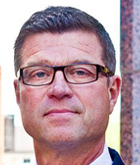Where could a 234 square mile, smart city be constructed in Arizona? Experts weigh in

A billionaire’s proposal to build a sustainable city in Arizona has at least one local technology leader excited, but real estate experts pointed out a few significant challenges to bringing the massive metropolis to the state.
Marc Lore, the co-founder of Diapers.com and former president and CEO of Walmart U.S. eCommerce, announced plans for the futuristic city dubbed Telosa on Sept. 1. As planned, the city would consist of roughly 234 square miles and have a population of 5 million people over 40 years.
The first phase of the city could be completed by 2030 and have 50,000 people living in a circular neighborhood. From there, Telosa would expand with subsequent layers of 1,500-acre neighborhoods. Telosa would also include renewable resources, autonomous cars and diverse housing, the project website said.
Other places Lore is considering include Idaho, Texas, Nevada, Utah and the Appalachian region. The Telosa website said the company will reach out “very soon” to state officials to determine where the city could be built.
Tech advocate hopeful
Steve Zylstra, president and CEO of the Arizona Technology Council, said he found out about the idea over the weekend when news started to spread.

“Arizona is a perfect spot for this,” Zylstra said, adding that the technology proposed in the city, like clean energy, solar power, autonomous vehicles and water reuse and self-sufficiency, are all already being used or developed in Arizona. “By 2030, which is the date suggested in the plan, all autonomous vehicles will likely be electric.”
Zylstra said if the city were to be developed in Arizona, it would bring a lot of brand awareness to the technology scene in the state.
“One thing I like is a big vision,” Zylstra said, adding that there already is an experimental city in Arizona, Arcosanti, which was designed as an experiment to test living frugally with very little impact on the environment.
Zylstra pointed to Microsoft founder Bill Gates’ purchase of a massive piece of land, where it is expected Gates will also try to develop a smart city, as an example of technology leaders looking to use their expertise and wealth to create a new city, which would be much easier to integrate technology into rather than trying to retrofit an existing one.
When asked by the Phoenix Business Journal about the idea of Telosa potentially building in Arizona, Gov. Doug Ducey said he was not familiar with the specifics of the idea, but said Arizona has a history of landing major technology investments like Taiwan Semiconductor Manufacturing Co., Lucid Motors, Nikola Corp, and said he was glad Lore was looking at the state.
Potential sites
The biggest challenge for the city, according to the Telosa website, is finding the right location for the development, which is intended to be as dense in population as San Francisco.
“Water, climate, logistics, and other features but the greatest challenge based on other new city projects, will likely be to generate public and political support,” the site said.
Phillip Hernandez, research manager for Colliers International in Phoenix, said the proposed development will have to take water and resources into consideration when choosing a site.
“I think that’s going to be the biggest driver for the decision maker on Arizona,” he said.
Recently, the Bureau of Reclamation announced the Colorado River water shortage amid an ongoing drought, which could impact economic developer’s ability to bring business to the Valley. Water in Telosa is planned to be cleaned, stored and reused.
Some real estate experts pointed to private and state-owned land further west of the Phoenix metro out to California, but several said it would be difficult to find that much available land without having to create an assemblage.
“State land will definitely be one of the bigger players,” Hernandez said. “Then obviously if you can mix state land with some type of small rural municipality, that would probably be your second option.”
Only 17% of Arizona’s land is privately owned, which makes it difficult to identify a location for a development as large as Telosa, but Anita Verma-Lallian, founder of Phoenix-based Arizona Land Consulting, said she believes it’s possible to develop further west toward Tonopah and Harquahala Valley.
“There is a mix of state and federal land in these pockets, so you will have some non-private land, but there is definitely a good amount of contiguous private land going west, even if you look at Buckeye, most of the stuff west of [State Route] 85 is all private land,” she said.
If the city could bring its own infrastructure, Verma-Lallian said that would help.
“I think that’s kind of the limiting factor right now, is there’s not much infrastructure out there, but if they have a solution for that, then I think they would have a lot of options,” she added.
Gates also planned to build a smart city in Arizona and spent $80 million on 25,000 acres of land outside of Buckeye. Rob Martensen, executive vice president for Colliers in Phoenix, said he doubts Telosa will want to build a city in the same place, but added that “anything is possible.”
“As you know, the land between here and [California] is pretty much endless. If the city is going to be fully self-sufficient, it could go anywhere,” he said in an email.
